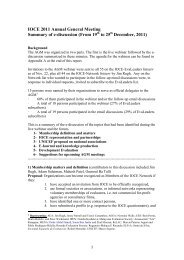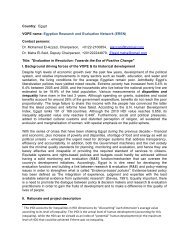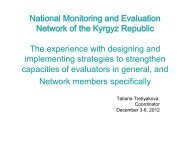42 Soojung Jangyears. Due to the scarcity of natural resources <strong>in</strong> Korea, the survival of its people has not been soeasy. For this reason most Koreans are <strong>in</strong>dustrious and hardwork<strong>in</strong>g <strong>in</strong> order to survive <strong>in</strong> thecompetitive social environment. <strong>The</strong>y pay much attention to the value of education and havegreat respect for highly educated people. Over the past few decades, Korean education hasexperienced an extraord<strong>in</strong>ary economic growth and has served as the prime force of nationalprogress. Surpris<strong>in</strong>gly, the literacy rate <strong>in</strong> Korea is up to almost one hundred percent. Everybodywants to get a higher education. K<strong>in</strong>ship and college alumni ties are very strong and comprise acritical part of Korean social relationships. Like most East Asian countries, Korea has been<strong>in</strong>fluenced by both Confucianism and Buddhism, but somewhat more bound to Confucianism.S<strong>in</strong>ce Korea is a small country, a more manageable and homogeneous unit than sprawl<strong>in</strong>g Ch<strong>in</strong>a,it may have been more uniformly and fully permeated by Confucian ideas than Ch<strong>in</strong>a was.Seniority, one of the most important Korean traditions stemm<strong>in</strong>g from Confucianism, is stillcherished, and there is a clear structure of authority <strong>in</strong> any k<strong>in</strong>d of social group such as families,bus<strong>in</strong>ess corporations and schools. <strong>The</strong> greater respect is accorded to elders and authorities, likea father <strong>in</strong> the family, a top manager <strong>in</strong> a bus<strong>in</strong>ess corporation, or a pr<strong>in</strong>cipal <strong>in</strong> a school. Manypeople pay much attention to family values and prioritize group <strong>in</strong>terests over <strong>in</strong>dividual rights.Many marriages are still arranged based on each part's agreement. Social honor and monetarywealth do not always go together. A person's reputation and mental health can not be redressed<strong>in</strong> f<strong>in</strong>ancial terms.Economy and PoliticsAs one of the "Four Economic Dragons of East Asia," South Korea has achieved an<strong>in</strong>credible record of growth. Three decades ago its Gross Domestic Production (GDP) per capitawas comparable with levels <strong>in</strong> the underdeveloped countries of Africa and Asia, but today itsGDP per capita is eight times India's, 15 times North Korea's and already at the levels of lessereconomies of the European Union. This success through the late 1980s was achieved by a systemof close government control, and has cont<strong>in</strong>ued through the first half of the 1990s. At the end of1997, an <strong>in</strong>ternational effort, spearheaded by the <strong>International</strong> Monetary Fund was underway toshore up reserves and stabilize the economy. Growth <strong>in</strong> 1998 was sharply cut. Long-term growthwill depend on how successfully South Korea implements planned economic reforms that wouldbolster the f<strong>in</strong>ancial sector, improve corporate management, and further open the economy toforeign participation. In the past, Korean <strong>in</strong>dustry mostly depended on agriculture, but now thefarm portion of the total population is just 9.7% as of 1998 (Korean National Statistics Office,1998). Accord<strong>in</strong>g to the Statistics Office of the Korean government, the Korean InformatizationIndex which is a standardized number to show how much and how broad <strong>in</strong>formation technologyaffects Korea for <strong>in</strong>ternational comparison, is 742, or about one seventh of United States Indexof 5350. But its rate of <strong>in</strong>crease of 40.2% is higher than that of the United States' at 34% (KoreanNational Statistics Office, 1997).Korea is a high technology society. <strong>The</strong> <strong>in</strong>ternet user population is about 28% of the wholepopulation, and wireless and mobile communication coverage rate is 37.6% (Kim, 2000). Shebegan to provide a free <strong>in</strong>ternational phone call service to U.S. <strong>in</strong> 1999.
<strong>The</strong> Appropriateness of Jo<strong>in</strong>t Committee <strong>Standards</strong> <strong>in</strong> Non-Western Sett<strong>in</strong>gs 43South Korea still has a strong central government. Even though it adopted an <strong>in</strong>dependentlocal adm<strong>in</strong>istration system <strong>in</strong> 1994, critical decisions are still made by the President, arepresentative of the central government. A top-down decision mak<strong>in</strong>g hierarchy is prevalent <strong>in</strong>many social organizations, which is one of vestiges of the Korean military regime. All healthyKorean men have the responsibility of military service for either a term of eighteen or twenty-sixmonths. Accord<strong>in</strong>g to the United Nations <strong>in</strong> 1997, a reliable mail<strong>in</strong>g and telephone systemspreads to almost every household. <strong>The</strong> Human Development Index of South Korea is ranked30th out of 174 countries.<strong>The</strong> Relationship of the College Entrance Exam to the Notion of <strong>Evaluation</strong>:<strong>Evaluation</strong> Anxiety<strong>The</strong> nature of evaluation practice is markedly different <strong>in</strong> Korea when compared to the UnitedStates where a variety of evaluation projects are done by every sector of society: government,bus<strong>in</strong>ess corporations and all levels of education for dozens of purposes. Korean educationalevaluation is centered on measurement and test<strong>in</strong>g. <strong>The</strong> major function of evaluations <strong>in</strong>education is selection and placement. This notion affects the evaluation practice of the entiresociety.<strong>The</strong> central government or bus<strong>in</strong>ess conglomerates ma<strong>in</strong>ly <strong>in</strong>itiate critical evaluationprojects seek<strong>in</strong>g <strong>in</strong>ternational experts. In many cases they deal with a k<strong>in</strong>d of organizationalchange, <strong>in</strong> that they need western substantive knowledge and highly advanced techniques.Korean stakeholders are <strong>in</strong>cl<strong>in</strong>ed to th<strong>in</strong>k that their social positions may be <strong>in</strong>fluenced by theproject results, which are frequently shown a k<strong>in</strong>d of organizational change result<strong>in</strong>g <strong>in</strong>structural replacement or expansion and cutbacks. Evaluat<strong>in</strong>g someth<strong>in</strong>g itself means thejudgment of value or merit of an object. But the notion of evaluation to Koreans goes beyond thetechnical mean<strong>in</strong>g, that is, Koreans are concerned about the effects of large-scale projectsconducted by western evaluators, and sometimes they feel <strong>in</strong>timidated simply by be<strong>in</strong>gevaluated. <strong>The</strong>y do not like evaluation. <strong>The</strong>y are <strong>in</strong>cl<strong>in</strong>ed to th<strong>in</strong>k that they are be<strong>in</strong>g measured<strong>in</strong> a certa<strong>in</strong> po<strong>in</strong>t, rather than be<strong>in</strong>g helped by an evaluation.Dur<strong>in</strong>g the past forty years, Korean notion of evaluation is especially related to the fiercecollege entrance exam<strong>in</strong>ation experience. Most Koreans go through a very pa<strong>in</strong>ful k<strong>in</strong>d ofevaluation: nationwide college entrance exam after one's secondary education is f<strong>in</strong>ished.Academic achievements are evaluated through the exam's total score. S<strong>in</strong>ce Koreans believe thatthe social level of a college diploma determ<strong>in</strong>es much of his future socioeconomic status, theymake every effort to enter prestigious colleges. S<strong>in</strong>ce so many people want to go to college, theadmission rate of 36% <strong>in</strong> 1998 is fairly low when compared to the number of applicants. Itcauses a phenomenon known as 'exam hell.' College entrance, as determ<strong>in</strong>ed by the exam scores,have <strong>in</strong>fluenced Korean society at large <strong>in</strong> the formation of eliticism, strong alumni units, orlimited <strong>in</strong>formation scope, even though criticism of the excessive competitiveness iscont<strong>in</strong>uously brought to the attention of the entire nation.
- Page 1 and 2: The Program Evaluation Standardsin
- Page 3 and 4: The editor acknowledges the valuabl
- Page 5 and 6: ForewordOn February 18-20, 2000, th
- Page 7 and 8: Hopefully, this volume will contrib
- Page 9 and 10: 5Cross-Cultural Transferabilityof T
- Page 11 and 12: Cross-Cultural Transferability of t
- Page 13 and 14: Cross-Cultural Transferability of t
- Page 15 and 16: Cross-Cultural Transferability of t
- Page 17 and 18: Cross-Cultural Transferability of t
- Page 19 and 20: Cross-Cultural Transferability of t
- Page 21 and 22: Cross-Cultural Transferability of t
- Page 23 and 24: Cross-Cultural Transferability of t
- Page 25 and 26: Cross-Cultural Transferability of t
- Page 27 and 28: Cross-Cultural Transferability of t
- Page 29 and 30: Cross-Cultural Transferability of t
- Page 31: Cross-Cultural Transferability of t
- Page 34 and 35: 30 Nick L. Smith, Saviour Chircop a
- Page 36 and 37: 32 Nick L. Smith, Saviour Chircop a
- Page 38 and 39: 34 Nick L. Smith, Saviour Chircop a
- Page 40 and 41: 36 Nick L. Smith, Saviour Chircop a
- Page 42 and 43: 38 Nick L. Smith, Saviour Chircop a
- Page 44 and 45: 40 Nick L. Smith, Saviour Chircop a
- Page 48 and 49: 44 Soojung JangThis test-based sele
- Page 50 and 51: 46 Soojung JangTable 1. Descriptive
- Page 52 and 53: 48 Soojung JangU2 Evaluator Credibi
- Page 54 and 55: 50 Soojung Janggenerous to foreigne
- Page 56 and 57: 52 Soojung Jangfeelings. This partl
- Page 58 and 59: 54 Soojung JangReporting Informatio
- Page 60 and 61: 56 Soojung JangU4 Values Identifica
- Page 62 and 63: 58 Soojung JangReferencesBecker, C.
- Page 64 and 65: 60Standards for Evaluation:On the W
- Page 66 and 67: 62 Wolfgang BeywlThe advantage of t
- Page 68 and 69: 64 Wolfgang BeywlA more direct way
- Page 71 and 72: 67Evaluating Evaluations: Does the
- Page 73 and 74: Evaluating Evaluations 69Bussmann 1
- Page 75 and 76: Evaluating Evaluations 71• Housin
- Page 77 and 78: Evaluating Evaluations 73Table 1: C
- Page 79 and 80: Evaluating Evaluations 75• Contra
- Page 81 and 82: Evaluating Evaluations 77References
- Page 83 and 84: Evaluating Evaluations 79Raven, J.
- Page 85 and 86: 81Evaluation StandardsRecommended b
- Page 87 and 88: Evaluation Standard Recommended by
- Page 89 and 90: Evaluation Standard Recommended by
- Page 91 and 92: Evaluation Standard Recommended by
- Page 93 and 94: Evaluation Standard Recommended by
- Page 95 and 96: Evaluation Standard Recommended by
- Page 97 and 98:
Evaluation Standard Recommended by
- Page 99 and 100:
Evaluation Standard Recommended by
- Page 101 and 102:
Evaluation Standard Recommended by
- Page 103 and 104:
Evaluation Standard Recommended by
- Page 105 and 106:
Evaluation Standard Recommended by
- Page 107 and 108:
103AnnexThe complete list of the or
- Page 109:
Annex 105A4 Defensible Information






